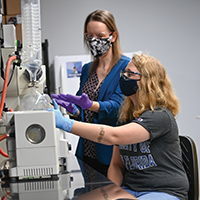twoColumn twoRight
Research Roundup: Where will researchers find the next generation of drugs?
 Mother Nature has inspired the majority of pharmaceuticals in use today, and researchers believe there are many natural frontiers left to explore. Dr. Amy Lane, associate professor of chemistry, has turned her focus to the ocean in an effort to tap into undiscovered resources and find the next big drug impacts for healthcare.
Mother Nature has inspired the majority of pharmaceuticals in use today, and researchers believe there are many natural frontiers left to explore. Dr. Amy Lane, associate professor of chemistry, has turned her focus to the ocean in an effort to tap into undiscovered resources and find the next big drug impacts for healthcare.Lane was encouraged in her pursuit by the success of a research group in Australia 10 years ago. From sediment samples they had gathered off the coast, the scientists discovered a marine bacterium that was able to create a new family of molecules. These molecules, like all others, are a series of atoms stitched together with chemical bonds into a unique structure. Yet the Australian bacterium was creating molecules with a never-before-observed structure that has shown promising activity against cancer cells.
“As it turns out, research by my group and others have demonstrated that marine bacteria are actually quite nice treasure troves of new molecules that are different from ones produced by land dwelling organisms,” Lane said. “So we are trying to harness that untapped potential with the discovery of new molecules from the ocean.”
Taking that work a step further, Lane and her student researchers also are tweaking nature. Using biotechnology techniques that allow them to insert and remove genes, the group is manipulating the genes of the Australian bacterium, which the scientists shared, as well as marine bacteria taken from Florida waters. Through this genetic engineering, they are directing the organisms to produce molecules that while related to the original molecules also have differences in the chemical structure. “So we are taking nature and aiming to create nature version 2.0,” Lane said. “In this way we hope to upgrade the native capabilities of these bacteria to make molecules that are even more promising drug candidates.”
Once created, the researchers screen the molecules for their ability to inhibit a variety of diseases. “We are optimistic and hopeful that everything we work on will yield long-term fruit in terms of benefiting healthcare,” said Lane, explaining that some of the molecules have been active on several types of kidney cancers. “It’s impossible, however, to say at the early stages what’s going to make it through the long pipeline of drug development, which can take a decade or more,” Lane said. “Hard work and a big dash of luck are needed to get there.”
For Lane, that work begins each year with a trip to the Florida Keys to search for marine organisms. With grants from the Florida Institute of Oceanography, she and several students spend one week living aboard one of the Institute’s research vessels. In coastal waters distant from habitation and its pollution, they collect samples of marine organisms from the water and sand. “The students get a full-immersion experience of living and working aboard a research vessel,” Lane said. “Then the rest of our work for the year begins when we return to our UNF lab.”
While Lane and her students are examining marine bacteria in her Lane Lab, many scientists are exploring the ocean’s fungi, seaweeds and sponges. Others continue to work on land organisms. Lane’s work is funded by both the National Science Foundation and the Camille and Henry Dreyfus Foundation, which is dedicated to the advancement of the chemical sciences. Lane also has a visiting scientist appointment at Mayo Clinic in Florida and has collaborated on a variety of projects with Mayo researchers in the cancer biology department.
As Lane’s research progresses, she and her students publish papers at each milestone along what she calls a continuum of discovery. “That’s the part of science that is both exciting and daunting,” Lane said. “Whenever you make a discovery, you answer one question, but that usually raises 10 more questions. I never really worry about running out of topics to explore.”
In this Edition
- Alumna’s Lab Passes the Test
- Caring Ospreys: UNF Alumni In Healthcare
- Dr. Thomas G. Carpenter: Founding President Shaped UNF
- On-Campus COVID Testing Offers ‘Win-Win’
- Research Roundup: How does sitting for hours affect your heart?
- Research Roundup: Where will researchers find the next generation of drugs?
- UNF MedNexus: Ensuring the Future of Florida’s Healthcare
